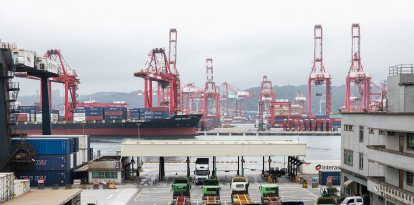Remittances, a system that finances dictatorships and sinks the U.S. economy
The money sent by immigrants living in the U.S. to their relatives in their countries of origin is produced in the U.S. and is not invested in the nation. On the contrary, it is mostly received in countries with dictatorships that take advantage of it to sustain their finances.

Dollar bill.
Remittances (money sent by immigrants living in the U.S. to their relatives in their countries of origin) have a significant impact on the economies of the world - and especially in undeveloped countries - such as those in Latin America.
The lack of immigration control - caused by the border chaos registered during the Biden Administration - meant, and still means, that this money can, in some cases, indirectly contribute to sustain authoritarian regimes or dictatorships. However, the problem goes beyond that. These massive sums of money also do nothing to grow the national economy.
William Davis, from AmericanThinker, argues that "Americans have a right to expect money earned through the U.S. economy to go back into the U.S. economy, not to foreign countries." He also points out that:
It is reasonable to expect people who come here to send some of the money they earn to family members still living in their home countries. However, this should be done in a responsible way that benefits the U.S. and does not create harmful incentives.
The US, the largest source of remittances worldwide
Remittances sent from the country represent a significant part of the world's remittance flow due to the large number of immigrants residing in its cities. According to World Bank data, in 2022, remittances sent from the U.S. to Latin America and the Caribbean alone amounted to approximately $74.6 billion (with countries such as Cuba, Mexico, Guatemala, El Salvador, and Honduras being the main recipients).
It is important to remember that the US is the largest source of remittances worldwide. The total flow of remittances globally is even larger, as it also includes remittances to other continents, such as Asia and Africa. Overall, global remittances that went out to the entire world two years ago are estimated at around $150 billion.
Given this huge figure of money leaving the country, Davis claims that "it is simply unacceptable for our government to allow foreigners to illegally enter our country, take job opportunities from U.S. citizens and then send the money they earn back to their home countries, often for the benefit of foreign regimes deeply hostile to the United States."
Countries that benefit most from remittances
President Biden's open borders immigration policy strengthens the stay in power of dictators in the region. Hundreds of migrants are arriving to the country to work and send aid to their families in their countries of origin, which has given a respite to the economies of countries such as Venezuela, Cuba and Nicaragua. A paper published by The Wall Street Journal noted:
Remittances also provide critical support to fragile states and autocratic regimes that rely on money earned by their citizens abroad to keep their economies afloat. Remittances to the developing world reached a record $647 billion, helping the poor but helping to keep strongmen in power from Nicaragua to Tajikistan.
In the case of Venezuela, the WSJ explains, one-third of households rely on money transferred by migrants to their families in that country. In the last year, one of the biggest challenges faced by the Democratic administration in terms of migration was the arrival of thousands of Venezuelans illegally (the number of Venezuelan migrants in the United States has tripled in the last decade).
The sending of money from abroad to Venezuela (with an economy that has contracted 75% in the last decade) helps prevent the humanitarian crisis from deepening. Remittances are crucial for people who have stayed behind, according to Angel Alvarado, a Venezuelan economist at the University of Pennsylvania: "You may ask, 'How come people are not starving in Venezuela?' The answer is that they have at least one child living abroad, sending money for food and medicine."
The situation in Nicaragua is similar, where remittances more than doubled between 2018 and 2022 after Daniel Ortega violently attacked protesters. So explains WSJ, which detailed that remittances are expected to account for at least 33% of that country's GDP. According to Enrique Saenz, a Nicaraguan economist in exile:
If there were no remittances, the national economy would collapse. And in macroeconomic terms, Ortega would be in serious trouble.
It is no different in the case of Cuba. Indeed, the situation on the island is evidence of how the end of remittances can affect societies ruled by dictators. Ted Henken, author of books on Cuba and a professor at Baruch College in New York, explained that income from abroad can help sustain a failed political system. "Remittances can somehow grease the wheel of a system that doesn't work."
In VOZ, we reviewed a few months ago, how Biden's policy shift toward the region's dictatorships is criticized by different public figures. The well-known Republican congresswoman, of Cuban origin, María Elvira Salazar recently assured that the Democratic president must understand that from Cuba, the communist dictatorship, drives the strategy that keeps Nicaragua and Venezuela under dictatorship as well.
"The government should not give oxygen to those who repress the people with the boot on the back of the neck. It is very simple, we must help the Cubans against the regime and the repression of Castroism that oppresses them. It is not that complicated. Cubans want what everyone in the West wants: freedom, travel, free market, education. It is a lie that they are Martians looking for something else," Salazar stressed during a conversation with La Política Online.
Taxing remittances: something possible?
To solve or try to clean up the mess, Davis proposes taxing remittances - as one solution - and claims this would also help stop illegal immigration: "Taxing remittances would not only curb illegal immigration, but the revenue generated from it could be used for border security priorities, including a wall on the southern border, more Border Patrol agents and more Immigration and Customs Enforcement agents."
High taxation of remittances is an obvious policy with almost zero downside for the U.S., which is probably why it hasn't happened. If the U.S. tried to tax remittances, there would be an immediate outcry from special interest and anti-border groups about how unfair and inhumane such a policy is, but foreign nationals and supporters of mass immigration should not be the priority of the U.S. government; U.S. citizens should be.


























